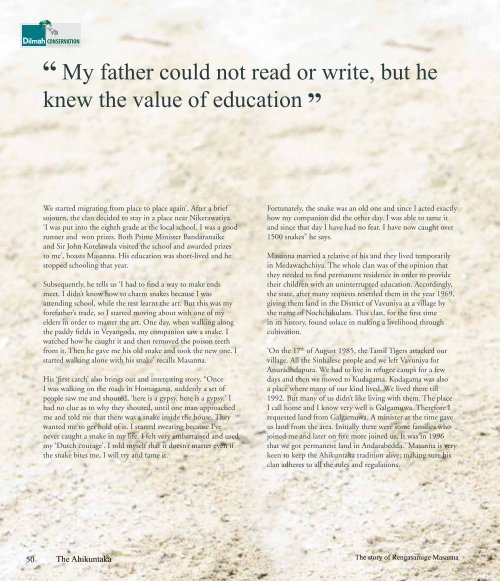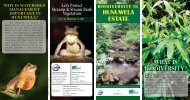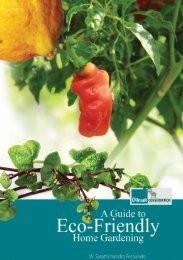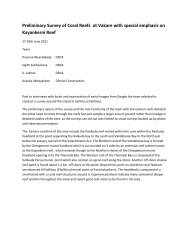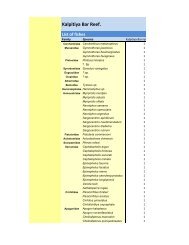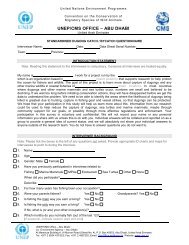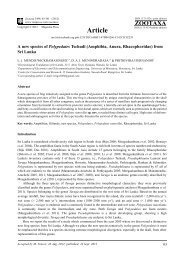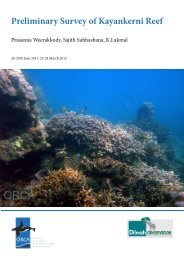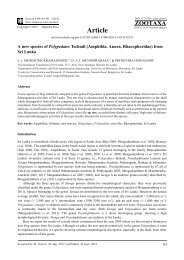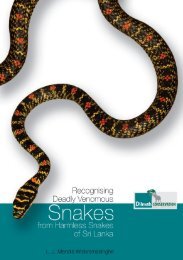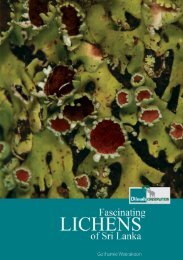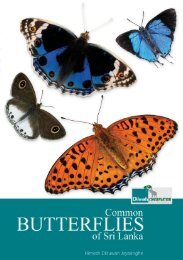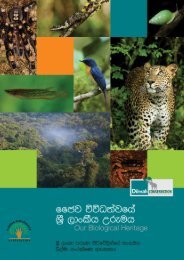The Ahikuntaka
A publication documenting the lives and livelihoods of the Ahikuntaka or gypsy community in Sri Lanka. A collection of vibrant photographs and a baseline survey on the current socio economic status of the Ahikuntaka conducted by the Colombo University complement this timely publication.
A publication documenting the lives and livelihoods of the Ahikuntaka or gypsy community in Sri Lanka. A collection of vibrant photographs and a baseline survey on the current socio economic status of the Ahikuntaka conducted by the Colombo University complement this timely publication.
You also want an ePaper? Increase the reach of your titles
YUMPU automatically turns print PDFs into web optimized ePapers that Google loves.
www.dilmahconservation.org<br />
My father could not read or write, but he<br />
knew the value of education<br />
We started migrating from place to place again’. After a brief<br />
sojourn, the clan decided to stay in a place near Nikerawatiya.<br />
‘I was put into the eighth grade at the local school. I was a good<br />
runner and won prizes. Both Prime Minister Bandaranaike<br />
and Sir John Kotelawala visited the school and awarded prizes<br />
to me’, boasts Masanna. His education was short-lived and he<br />
stopped schooling that year.<br />
Subsequently, he tells us ‘I had to find a way to make ends<br />
meet. I didn’t know how to charm snakes because I was<br />
attending school, while the rest learnt the art. But this was my<br />
forefather’s trade, so I started moving about with one of my<br />
elders in order to master the art. One day, when walking along<br />
the paddy fields in Veyangoda, my companion saw a snake. I<br />
watched how he caught it and then removed the poison teeth<br />
from it. <strong>The</strong>n he gave me his old snake and took the new one. I<br />
started walking alone with his snake’ recalls Masanna.<br />
His ‘first catch’ also brings out and interesting story. “Once<br />
I was walking on the roads in Homagama, suddenly a set of<br />
people saw me and shouted, ‘here is a gypsy, here is a gypsy.’ I<br />
had no clue as to why they shouted, until one man approached<br />
me and told me that there was a snake inside the house. <strong>The</strong>y<br />
wanted me to get hold of it. I started sweating because I’ve<br />
never caught a snake in my life. I felt very embarrassed and used<br />
my ‘Dutch courage’. I told myself that it doesn’t matter even if<br />
the snake bites me, I will try and tame it.<br />
Fortunately, the snake was an old one and since I acted exactly<br />
how my companion did the other day. I was able to tame it<br />
and since that day I have had no fear. I have now caught over<br />
1500 snakes” he says.<br />
Masanna married a relative of his and they lived temporarily<br />
in Medawachchiya. <strong>The</strong> whole clan was of the opinion that<br />
they needed to find permanent residence in order to provide<br />
their children with an uninterrupted education. Accordingly,<br />
the state, after many requests resettled them in the year 1969,<br />
giving them land in the District of Vavuniya at a village by<br />
the name of Nochchikulam. This clan, for the first time<br />
in its history, found solace in making a livelihood through<br />
cultivation.<br />
‘On the 17 th of August 1985, the Tamil Tigers attacked our<br />
village. All the Sinhalese people and we left Vavuniya for<br />
Anuradhdapura. We had to live in refugee camps for a few<br />
days and then we moved to Kudagama. Kudagama was also<br />
a place where many of our kind lived. We lived there till<br />
1992. But many of us didn’t like living with them. <strong>The</strong> place<br />
I call home and I know very well is Galgamuwa. <strong>The</strong>refore I<br />
requested land from Galgamuwa. A minister at the time gave<br />
us land from the area. Initially there were some families who<br />
joined me and later on five more joined us. It was in 1996<br />
that we got permanent land in Andarabedda.’ Masanna is very<br />
keen to keep the <strong>Ahikuntaka</strong> tradition alive; making sure his<br />
clan adheres to all the rules and regulations.<br />
50 <strong>The</strong> <strong>Ahikuntaka</strong><br />
<strong>The</strong> story of Rengasamige Masanna


